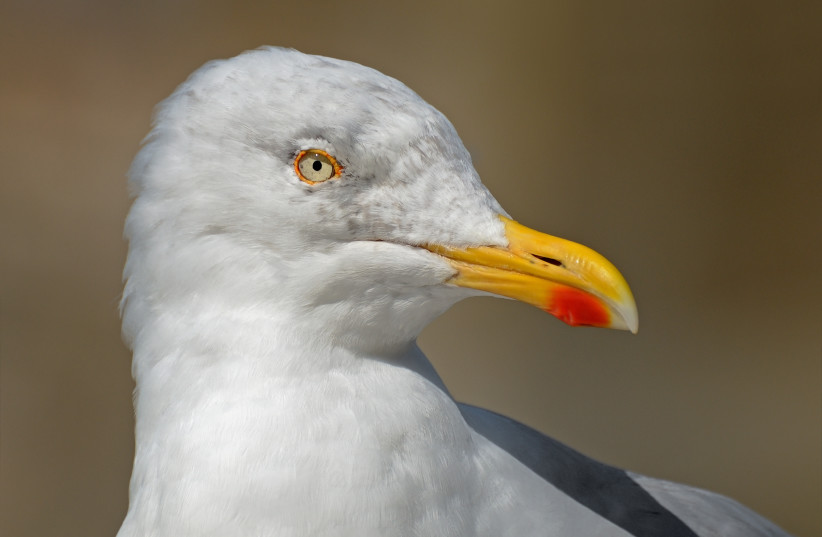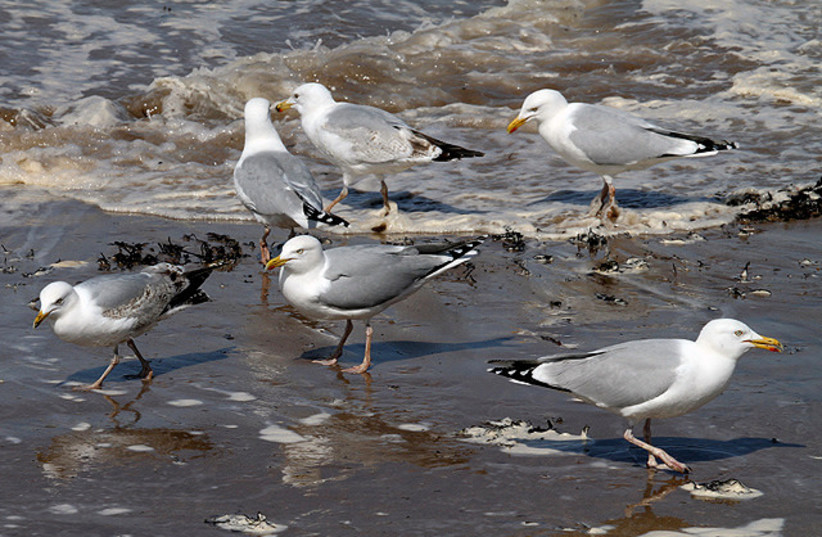Gulls choose what to eat by imitating humans - study
The researchers chose to study the behavior of herring gulls which are one of few species that thrive in anthropogenic landscapes, meaning they are very familiar with humans.
By JERUSALEM POST STAFF, MAY 24, 2023

Head of European herring gull (Larus argentatus). (photo credit: Wikimedia Commons)
Urban gulls pay close attention to the food that nearby humans eat
and, if given the choice, will mimic them and prefer to eat the same
food 95% of the time, according to a new study.
The peer-reviewed study was published in Biology Letters on May 24.
The
researchers chose to study the behavior of herring gulls (Larus
argentatus) which are one of few species that thrive in anthropogenic
landscapes, meaning they are very familiar with humans, which enabled
the researchers to study inter-species social cognition through them.
Gulls living in an urban environment pay close attention to human behavior surrounding food and are known to steal food - they are kleptoparasites, to use the scientific term.
 |
Head of European herring gull (Larus argentatus). (photo credit: Wikimedia Commons) |
Urban gulls pay close attention to the food that nearby humans eat and, if given the choice, will mimic them and prefer to eat the same food 95% of the time, according to a new study.
The peer-reviewed study was published in Biology Letters on May 24.
The researchers chose to study the behavior of herring gulls (Larus argentatus) which are one of few species that thrive in anthropogenic landscapes, meaning they are very familiar with humans, which enabled the researchers to study inter-species social cognition through them.
Gulls living in an urban environment pay close attention to human behavior surrounding food and are known to steal food - they are kleptoparasites, to use the scientific term.
Gulls seem to have high cognition levels
“Many people still
think that gulls are not very smart, even though kleptoparasitism to us
suggested a higher level of cognition, so we wanted to explore this
further,” Franziska Feist from the University of Sussex, UK, told
Newscientist.
 Herring gulls at North Berwick. (credit: Wikimedia Commons)
Herring gulls at North Berwick. (credit: Wikimedia Commons)The
research team attempted to manipulate the gulls' attention through cues
and then analyzed their reaction for a few months on the Brighton
beachfront in 2021 and 2022. They gave the herring gulls the choice
between two differently colored food items. For example packs of potato chips, in the presence of a human who either did nothing or ate food that matched one of the two food items in front of the gulls.
Of
the observed gulls, 48% approached the food when the experimenter was
eating, versus 19% when they weren't eating. When they did approach the
food, they overwhelmingly chose the same color that the experimenter was
eating 95% of the time.
“Many people still think that gulls are not very smart, even though kleptoparasitism to us suggested a higher level of cognition, so we wanted to explore this further,” Franziska Feist from the University of Sussex, UK, told Newscientist.

The research team attempted to manipulate the gulls' attention through cues and then analyzed their reaction for a few months on the Brighton beachfront in 2021 and 2022. They gave the herring gulls the choice between two differently colored food items. For example packs of potato chips, in the presence of a human who either did nothing or ate food that matched one of the two food items in front of the gulls.
Of the observed gulls, 48% approached the food when the experimenter was eating, versus 19% when they weren't eating. When they did approach the food, they overwhelmingly chose the same color that the experimenter was eating 95% of the time.
Gulls look to humans to decide what to eat
The researchers
concluded that gulls can use human cues to enhance stimuli and influence
their decision on what to forage. Since they haven't spent a lot of
time in urban environments, evolutionarily speaking, these abilities
could be a by-product of the cognitive flexibility inherent in
kleptoparasitic species.
“The
evolutionary history of herring gulls wouldn’t have involved humans,
since their urbanization is rather recent,” says Feist. “So the skills
we identified, those that allow them to learn from another species
through observations, must come from more general purpose intelligence,
rather than an innate ability. This is a very exciting notion to me.”
“I think it shows very clearly that gulls are highly adaptable birds when it comes to foraging,” said Damien Farine from the University of Zurich in Switzerland.
Madeleine
Goumas at the University of Exeter, UK, said studies like this can play
a role in minimizing conflicts between humans and gulls, but the birds’
use of human food cues may be problematic.
“Gulls seem to have realized that we are a great information source
when it comes to finding food,” she says. “However, the kind of
processed food humans eat is a relatively new addition to wild animals’
diets and it is unclear whether it is actually beneficial for them,
which is a concern when the species is declining.”
The researchers concluded that gulls can use human cues to enhance stimuli and influence their decision on what to forage. Since they haven't spent a lot of time in urban environments, evolutionarily speaking, these abilities could be a by-product of the cognitive flexibility inherent in kleptoparasitic species.
“The evolutionary history of herring gulls wouldn’t have involved humans, since their urbanization is rather recent,” says Feist. “So the skills we identified, those that allow them to learn from another species through observations, must come from more general purpose intelligence, rather than an innate ability. This is a very exciting notion to me.”
“I think it shows very clearly that gulls are highly adaptable birds when it comes to foraging,” said Damien Farine from the University of Zurich in Switzerland.
Madeleine Goumas at the University of Exeter, UK, said studies like this can play a role in minimizing conflicts between humans and gulls, but the birds’ use of human food cues may be problematic.
“Gulls seem to have realized that we are a great information source when it comes to finding food,” she says. “However, the kind of processed food humans eat is a relatively new addition to wild animals’ diets and it is unclear whether it is actually beneficial for them, which is a concern when the species is declining.”

No comments:
Post a Comment
Stick to the subject, NO religion, or Party politics